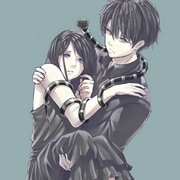Consumed by the darkness, Orpheus found himself unable to see anything at all. Even when the shifting realm ceased its abuse and left him still in the smothering shadows, his eyes revealed nothing.
His other senses, however, told quite a different tale: he covered his face and wretched as the stench of roasting flesh reached him on the wind. The persistent scream that came with it sent him fleeing in the opposite direction. It was only a short time before his hasty steps took him into what felt like a shallow pool. The bard quickly stumbled back.
“Who’s that?” came a sudden voice through the darkness. Orpheus squealed in fright and fell back onto his rear, his eyes pointlessly darting about to seek the speaker. He pushed away from the unseen stranger, but stopped when he noticed that there was no sound to suggest he was being pursued.
“Another trick of Tartarus?” he heard the other say. The stranger sniffed the air. “No. No! I can smell you there.”
Despite the assertion, the stranger still did not move nearer to the bard. Emboldened by the distance, Orpheus swallowed hard and climbed to his feet. His fingers found the lyre on his belt, and he plucked a string. The single soothing note lent greater light to the luminous instrument, which finally managed to break the darkness of that deepest realm for a short few moments.
The light showed Orpheus an aged and emaciated figure standing knee-deep in the pool. The elaborate designs on his tattered rags gave the impression that he’d once been dressed in enviable finery. The rusted crown atop his head was proof to Orpheus that he stood before a king that had fallen as far as any king could. Crouched there in the murky waters, he struck a pathetic figure not at all befitting of royalty. Orpheus’ fear was broken at once.
The fallen king shielded his eyes against the light. “It burns!” he cried. “Put it out!”
Orpheus refused. He plucked the lyre again to sustain the gleam. “This is Tartarus?” he queried.
“It is, my lord, it is!”
“Lord?” Orpheus quirked a brow, then chuckled to himself. “You think me a god.”
“Are you not?” asked the stranger. He sniffed the air again. “No. You are better than a god.”
“You think so?”
“Oh yes. Gods walk easily amidst the shades, but rare is the day when Hades sees a conquering mortal. Your presence is a mighty balm indeed.”
The high praise put a smile on Orpheus’ face. “It has not been easy,” he said. “But my lyre is of Apollo himself, and my art has won the god’s praise. It is a power that has brought me many victories over the dark forces that dwell here.”
“I have no doubt,” spoke the stranger. “Perhaps you would claim such a victory on my behalf.”
“Hm? What do you want?”
Absently, the fallen king stretched his bony arms upward to reach for a bushel of berries hanging just over his head from a tree that Orpheus could not see. Inexplicably, his reach fell short no matter how desperately he strained. He soon surrendered, gasping for air even after that short bout of activity.
The weakened stranger dropped to his knees, and Orpheus watched in wonder as the water receded to keep clear of the haggard ancient’s face. The man grimaced and scoffed bitterly before squinting at his bright guest again.
“The fruit,” he said. “The waters. They deny me without fail. Long have I stood here straining and starving, bound by the cruel whims of Fate.”
Orpheus’ mouth fell ajar. “The Sisters have treated me cruelly as well,” he admitted. “That is why I am here.”
“Then you must understand! Please, have pity on me. Let me taste but a single morsel with your aid.”
The request sounded reasonable enough, but though he at first moved to fulfill it, the bard stopped short. “Tartarus is the domain of the damned,” he observed. “What have you done to earn a place here?”
The fallen king heaved a sigh. “I sought to prove the fallibility of the ever-living gods. What mortal has not longed to see that haughty lot brought low? My only crime is daring to take action to bring their failings to light. For that, I am bound here in torment.”
Orpheus hesitated. He took a step back. “If you quarrel with the gods, then that is your folly. I’ll not risk losing their favor for your sake.”
“Just a morsel!” the stranger cried. “I beg you! They shall never know of it!”
Though moved by the fallen king’s pleas, Orpheus held fast to his purpose and steeled himself. “No,” he stated flatly. “For the sake of my love, I must not.”
At this, the stranger’s meekness broke. He leaped at Orpheus with strength his weakened form should never have allowed, snarling and seething on his mad dash toward the bard. Orpheus recoiled, but a sudden upswell from beneath the waves spared him the need to flee.
A mass of shadow rose to constrict the fallen king and force him back beneath the tantalizing branches. He struggled helplessly against the mysterious force, entirely consumed by savage fervor.
“You are not supposed to move,” came a voice much sweeter than the fallen king’s. Orpheus realized that it came from the binding shadows, and soon enough, a shapely specter separated itself from the mass. It came to stand on the shore alongside Orpheus, and enough of the darkness slipped away to reveal the delicate features of a maiden whose deathly pallor contrasted her youth.
She kept her attention on the starved stranger as he writhed and flailed in water that ever shifted to avoid his tongue. Lightly, she sighed. “A sorry sight, but a sorrier soul,” she observed coldly. “You were wise to deny him; I am sure he only wished to eat you.”
Orpheus’ features twisted in disgust. “What vile man would ever do such a thing?” he asked.
“A man who sought to feed the gods with the flesh of his own son,” the maiden answered. She turned then to face the wayward bard, and when he recognized the bright green eyes of the stolen Spring Maiden, he prostrated himself at once.
“Bride of Hades!” Orpheus exclaimed. “At last, Fate smiles on me!”
Alas, his mirth went unreciprocated by the Iron Queen Persephone, who pursed her lips as she looked down at the unwelcome interloper with a dark and pensive stare.












Comments (0)
See all